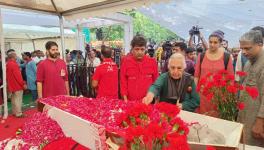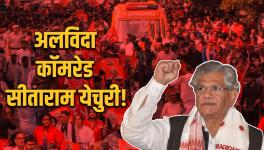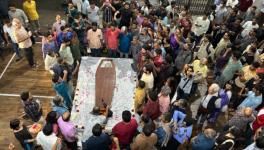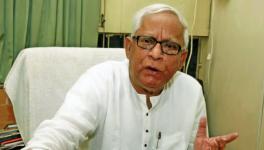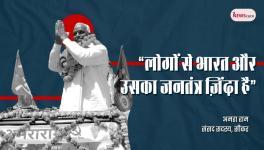TN Local Polls: Poor Roads, Mosquito Menace, Water Crisis & Other Issues Highlighted
During the 2021 monsoon in Chennai
As the heated week-long campaign for the urban local body (ULB) election in Tamil Nadu came to an end on February 17 evening, candidates and party members carried out high-spirited propaganda in the last stretch.
Although the leaders of the political parties were seen lashing out at one another, in the local areas, the lack of necessary civic amenities was the centre of discussion.
In the door-to-door campaigns, civilians expressed their worries to the candidates, and the contestants were seen making promises of fulfilling their demands if voted to power.
Stormwater drainage, proper roads, underground sewerage system, piped water supply connections, the solution to the mosquito menace and answers to the housing crisis are primary demands in the urban areas.
It is usually a practice in the local body polls to vote for the ruling party alliance in the state in the hope that if the local representative is on good terms with the state administration, their issues would be resolved fast and smoothly.
Let’s take a look at the key issues that were raised in the election rallies and processions.
WATER STAGNATION ISSUES
The absence of a proper stormwater drainage system and the accompanying recurring inundation of low-lying areas during monsoon seasons are major issues in the cities.
Besides the difficulty of mobility during the rainy season, stagnant water spoils the roads and leads to mosquito breeding, which are also big issues in urban areas.
An open canal with stagnant water in K K Nagar, Chennai
The mosquito menace is so significant that state leaders across political lines have made special mention of it in their campaigns, such as Seeman of Naam Tamilar Katchi (NTK) and Premalatha of Desiya Murpokku Dravida Kazhagam (DMDK). Communist Party of India (Marxist) (CPI(M)) state secretary K Balakrishnan accused the previous All India Anna Dravida Munnetra Kazhagam (AIADMK) government of corruption even in the eradication of mosquitoes and garbage removal.
Given that monsoons shatter the roads year after year, people regularly mount pressure on the elected representatives to re-lay the tar roads. However, the roads are rarely milled before laying them again, which means that the height of the roads increase and the adjoining houses sink. This is a big reason for water entering homes on the ground floor, even during moderate rains. So, mandatory milling of roads before relaying them has come up in these elections.
Another important reason for rainwater entering houses is encroachment in low-lying lying areas, but the candidates have not proposed uprooting people from these occupied water bodies. They provide the alternative of constructing underground stormwater drains.
DELAYS AND POOR PROJECTS
Roads are repeatedly dug to lay electricity lines, extend water pipelines, and construct stormwater drains and sewerage lines. However, wherever these works were recently carried out, the roads are damaged, and the usable portion of the road is reduced in width.
People also complain of incomplete projects and poorly done work, such as seepage of sewage into the stormwater drain network and heavy road damage, leaving it dangerous for commuters.
Open drainage in a locality Ambattur
S Velaswami of CPI(M) contesting on behalf of the Secular Progressive Alliance (SPA) for the Municipal Corporation Ward Number 148 in Nerkundram, Chennai, told NewsClick, “When I was the ward member more than ten years back the underground water pipeline work was initiated, it has since been abandoned.”
Shrinking water bodies is a big problem; it has led to large-scale water scarcity in big cities like Chennai and Madurai. The well-off localities have water pipeline supply to their houses, but those dependent on borewells are left with no other option but to buy water tankers during summer.
Although water bodies have shrunk, even the existing ones are not maintained well. They are not silted regularly and are common places for dumping garbage, especially in areas garbage collection is poor.
OTHER ISSUES
Families living in housing board tenements, particularly in Chennai, fear being evacuated and moved to the suburbs. They are demanding the candidates for expansion and upgradation of houses in the same locality.
Water stagnation in a housing board locality in Chennai
Pattas for residents who have been living in the same area for many decades is a long pending demand that has been addressed in the campaigns.
Decongestion of traffic in arterial roads adjacent to residential areas and even inside residential areas is also promised by candidates in relevant wards.
In neighbourhoods around landfills, foul smells, air pollution, and microplastics contaminating the groundwater have been unaddressed issues for several years and are taken up in these polls.
CORRUPTION FREE LOCAL BODY
Candidates belonging to parties other than the two big parties - Dravida Munnetra Kazhagam (DMK) and AIADMK- that have ruled the state for 50 years campaigned, saying that if they are voted to power, there would be no place for corruption. This includes the DMK-alliance parties, such as the Communist parties.
In areas where big-shot businessmen candidates are contesting, other candidates are promising corruption-free and approachable local bodies. There have been complaints of extensive encroachment of common land by such persons.
The Communist Party of India (CPI) candidate Elumalai, contesting in Ward 195 in Chennai, told the voters, “if I am voted to power, the doors of the Corporation office will be open for common people to walk in at any time and express their concerns to me.” Notably, C Govindasamy of AIADMK was the previous Councillor for Ward 195.
The MNM has made corruption-free local governance their primary promise. They are also promising setting up of area sabhas which meet regularly, similar to gram panchayats.
The everyday issues were so many in each ward that there is little scope for more constructive demands from the people and promises from candidates. Local libraries, playgrounds, community halls, fitness centres and other such proposals around sports and leisure were hardly visible in the campaigns.
Given that the local body polls were pending for ten long years, those who are voted to power would have a lot of work to accomplish.
Unlike the Assembly and Parliamentary elections, ground-level contacts of party cadres and candidates greatly impact who is voted to power. The candidates are often family members, neighbours or a person of long-time contact, and these impact voting patterns.
The single-phase election poll is scheduled for February 19, and more than 2.50 crore people will cast their votes.
Get the latest reports & analysis with people's perspective on Protests, movements & deep analytical videos, discussions of the current affairs in your Telegram app. Subscribe to NewsClick's Telegram channel & get Real-Time updates on stories, as they get published on our website.










